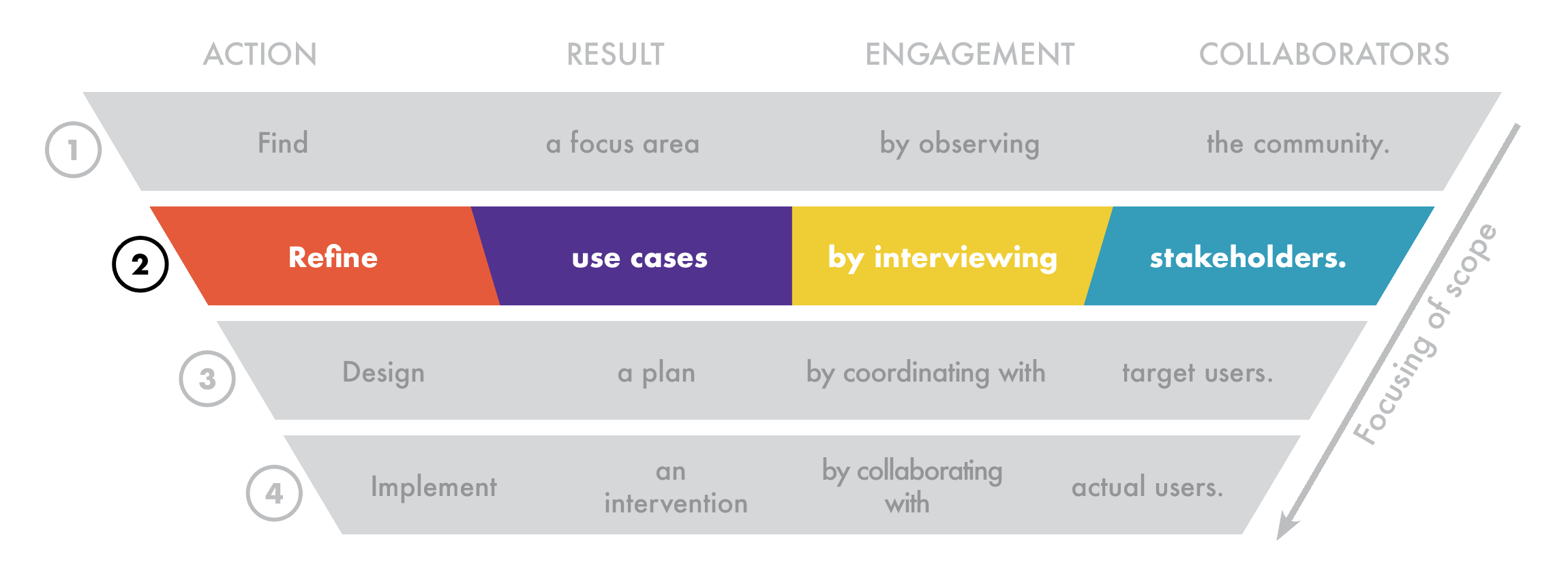Step 2: Refine
- THE ACTION: Narrow and segment your focus area down to detailed use case scenarios, complete with user stories and personas that expose opportunities for the use of open data.
- THE ENGAGEMENT: Collect context and information from specific stakeholders via direct conversations or interviews.
- THE COLLABORATORS: Stakeholders who have academic or lived experience and insight into your chosen focus area, and who can refine the scenarios for potential open data use.
- THE RESULT: A few promising open data use cases that outline the potential impact of supporting specific open data use scenarios via user stories and user personas.
The second step in TDE is to refine your broad focus area into a more specific opportunity or “use case” with the help of people who have a deeper understanding of your chosen issue. “Use case” is a term meant to describe how data might be used by a certain user to solve a particular goal. The residents identified in these use cases will have “user personas” and you should take this time to develop your understanding of their stories. More than simply a problem statement, a use case scenario should dive deep into understanding a stakeholder who could use open data to address their concern within your focus area. In crafting various use case scenarios, remember that residents are experts in their own neighborhoods, communities, and issue areas, and listening to their knowledge will help refine the details around specific use cases in your focus area.
To complete this step, you should narrow down a few promising use case scenarios with particularly strong community partner support, strong resident interest, or obviously relevant gaps in information or data. Hearing about residents’ data use scenarios and incorporating their thoughts into what you determine are “promising” opportunities will help residents’ experiences matter in ultimately crafting a TDE intervention. Being as detailed as possible in this stage ensures that when you craft an intervention to address a single use case later on, the result will have dedicated end users, who you identified in this step, and will meet their real needs.
Tactics to help you refine use cases:
| TACTIC | DESCRIPTION |
|---|---|
| Interview stakeholders individually | Identify and survey or interview individual stakeholders around your chosen focus area. Individuals with relevant perspectives may include individuals who requested data about your chosen issue, who work in relevant fields, who commonly interact with services, or who are most greatly affected by issues within your focus area. Consider their responses for details about their open data needs and the potential impacts of addressing those needs, and use that insight to generate one or more use cases. |
| Host a “scope-a-thon” | Host an event where local nonprofits, researchers, civic hackers, government officials, journalists, and other stakeholders can gather to brainstorm what the most pertinent opportunities are for open data’s use within your chosen focus area. Scope specific stakeholders’ needs and find details about how better open data might generate impact. Collaboratively generate one or more promising, detailed use cases. |
| Consult data users and experts | Convene a user group meeting with local data experts to generate ideas for which opportunities within your focus area might be most pressing or feasible to address with data. Leverage local knowledge and data user feedback to find how open data can fit into solutions for residents. Collect subject matter detail on how addressing open data needs might play a role in community impact to develop a use case scenario. |
| Consult the public | Attend meetings or plan a community meeting centered around your focus area. Collect detail on specific issues, for example by conduct low-tech, digital, verbal, or physical exercises and try to tailor activities to a wide range of experience levels for the general public. “Data days,” “data walks,” or similar events, where residents can see and comment on data in person, or other hands-on activities could help residents express specific details about use cases for better data or information within a focus area. |
| Workshop with partners | Gather your trusted partners and brainstorm ways that each partner can reach out to their own community network and assess what specific needs within your focus area might benefit from the use of open data. Host workshops to come up with a specific use cases based on expressed community needs. |